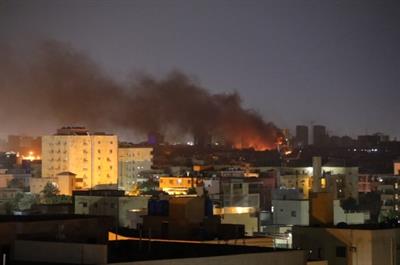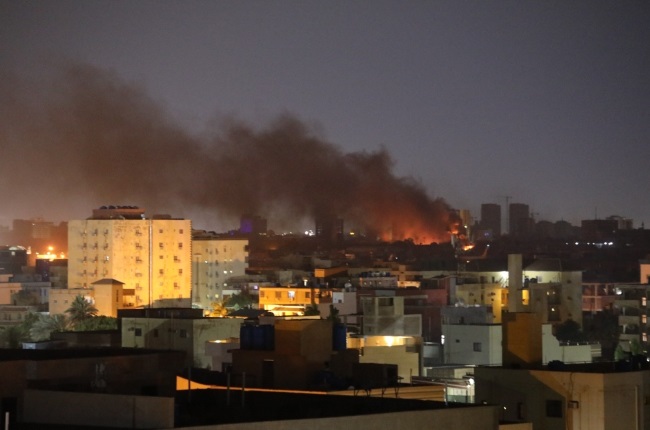- Thursday marked the third month since violence erupted in Sudan with the army clashing with a paramilitary group.
- As of 9 June, the death toll was estimated at over 2 000.
- West Darfur governor Khamis Abdullah Abaka was killed on Wednesday hours after he made remarks critical of the paramilitaries in a telephone interview with a TV news channel.
Sudan’s devastating war raged on into a third month Thursday as the reported death toll topped 2 000 and after a provincial governor was killed in the remote Darfur region.
The army headed by Abdel Fattah al-Burhan has since 15 April fought the paramilitary Rapid Support Forces (RSF) commanded by his former deputy Mohamed Hamdan Daglo.
The fighting has driven 2.2 million people from their homes, including 528 000 who have fled to neighbouring countries, says the International Organization for Migration.
“In our worst expectations, we didn’t see this war dragging on for this long,” said one Sudanese citizen, Mohamad al-Hassan Othman, who has fled his home in Khartoum.
Everything in “our life has changed,” he told AFP.
He added:
We don’t know whether we’ll be back home or need to start a new life
The death toll has risen above 2 000, according to the Armed Conflict Location and Event Data Project’s latest figures which cover fighting until 9 June.
In long-troubled West Darfur, the violence claimed the life of Governor Khamis Abdullah Abakar, hours after he made remarks critical of the paramilitaries in a telephone interview with a Saudi TV channel.
The United Nations said “compelling eyewitness accounts attribute this act to Arab militias and the RSF”, while the Darfur Lawyers Association condemned the act of “barbarism, brutality and cruelty”.
Burhan accused his paramilitary enemies of the “treacherous attack”, while the RSF denied responsibility and for its part said it condemned Abakar’s “assassination in cold blood”.
READ | ‘If this war does not stop immediately, the Sudanese state will totally collapse’ – AU Commission
It said he was killed after being “abducted” from RSF protection, which “the governor had requested”.
Sudan analyst Kholood Khair of the Khartoum-based think tank Confluence Advisory said in a tweet that the “heinous assassination” was meant “to silence his highlighting of genocide… in Darfur”.
Khair added that it was unclear “what the red lines are anymore” and urged for international “action to protect the people of Darfur and elsewhere”.
Completely devastated
US and Saudi mediation efforts are at a standstill after the collapse of multiple ceasefires in the face of flagrant violations by both sides.
“We have been suffering and suffering and suffering the scourge of this war for two months,” said a Khartoum resident, Soha Abdulrahman.
A record 25 million people – more than half the population – are in need of aid, according to the UN, which says it has received only a fraction of needed funding.
READ | ‘I was sure we were about to die’: Sudan women battle to survive mass rapes, attacks in war
Saudi Arabia has announced an international pledging conference for next week.
“We have nothing left,” said another person living in the capital, Ahmed Taha. “The entire country has been completely devastated.
“Everywhere you look, you’ll see where bombs have fallen and bullets have struck. Every inch of Sudan is a disaster area.”
Many of the displaced have lost loved ones as well as “all their belongings and livelihoods”, said Anja Wolz of aid group Doctors Without Borders.
The group, which runs mobile clinics for the displaced in Madani, 200 kilometres southeast of Khartoum, noted a “worrying increase” in people escaping the capital.
Disaster zone
Darfur, one of the war’s main battlegrounds, was already scarred by a two-decade conflict that left hundreds of thousands dead and more than two million displaced.
Daglo’s RSF have their origins in the Janjaweed militias which former strongman Omar al-Bashir unleashed on ethnic minorities in the region in 2003, drawing charges of genocide, war crimes and crimes against humanity.
Homes and markets have been burnt to the ground, hospitals and aid facilities looted and more than 149 000 people sent fleeing into neighbouring Chad.
The Umma Party, one of Sudan’s main civilian groups, said El Geneina, the capital of West Darfur state, had been turned into a “disaster zone”, and urged international organisations to provide help.
The Darfur Lawyers Association reported that, in El Geneina, “cross-border militias supported by the RSF” had carried out “massacres and ethnic cleansing”.


